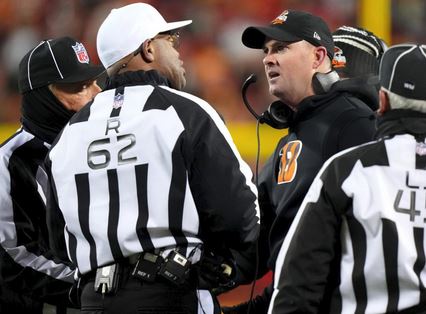Podcast: Play in new window | Download
Subscribe: RSS
The referees in major professional sports became a big part of the story line once again over the weekend. One of Twitter’s fastest trending searches today has been “NFL Rigged”.
This phenomenon seems to happen nearly every season during the AFC and NFC Championship weekend games. To many of us, it seems like the NFL referees often find a way to guide games toward a preferred outcome when the Super Bowl game is on the line.
New Orleans Saints fans will never forget the team’s crushing 2019 NFC Championship game loss to the Los Angeles Rams. The NFL referees did not throw a flag on one of the most obvious missed pass interference plays in recent league history.
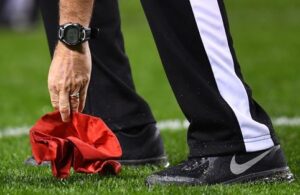
If a pass interference call had been made in the Superdome four years ago, the Saints would have retained the football with a first down inside the Rams’ 10-yard line.
The Saints were in a position to run the fourth quarter clock down to under twenty seconds and attempt a field goal from extra point distance and (perhaps) win the game 23-20. It would have sent the Saints and 40-year old quarterback Drew Brees into a second Super Bowl appearance. They would have faced Tom Brady and the New England Patriots.
At least the Patriots beat the fraudulent NFC champion Rams 13-3. As a long-time Saints fan, it still hurts.
Today, millions of Cincinnati Bengals fans have a right to be disappointed in the final outcome of Sunday’s thriller against the Kansas City Chiefs.

The NFL referees (whether intentional or not) again became a huge part of the storyline associated with a championship game.
Let’s start by giving credit to the striped shirts for making one correct call during crunch time.
The Bengals’ overzealous linebacker Joseph Ossai made a serious error by pushing Chiefs’ quarterback Patrick Mahomes after the NFL’s MVP was clearly out-of-bounds with seconds remaining in a 20-20 tie game. The boneheaded defensive play gave Kansas City an extra 15 yards and an opportunity to kick the game winning 45-yard field goal with just eight seconds remaining.
As a result, the Kansas City Chiefs will play the Philadelphia Eagles in the Super Bowl in two weeks.
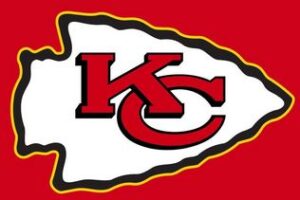
Just a few plays prior to the final second out-of-bounds penalty call, the NFL referees clearly swallowed their whistles on a punt return play by Kansas City with only 41 seconds remaining in the game. As the football was in the air, a Kansas City blocker blatantly pushed down a Cincinnati defender. The referees didn’t see it, and no penalty was called.
After the Chiefs’ punt returner caught the ball and headed upfield on this nifty 29-yard return, another KC player obviously pushed another Cincinnati player in the back. Again, there was no whistle blown on this crucial punt return play by Kansas City.
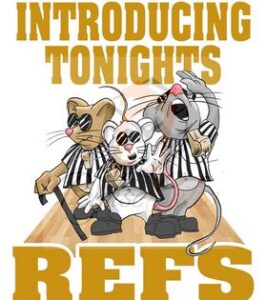
The ugly truth is that there are penalties which could be called on almost every play during any NFL game.
This is not always the direct fault of the referees, though. They take their orders from the NFL’s upper management. The same people who provide them with a hefty paycheck for their work.

The league and its teams of referees allow players to get away with a significant amount of less obvious penalties in an effort to speed-up NFL games to approximately three hours. It greatly pleases the NFL’s advertisers when they feel more certain about when their spots are going to air.
The NFL has also spent a lot of money on research confirming that pro football fans watching games on television do not want them to last more than three hours.
On a normal Sunday, NFL games all begin at 12 Noon Central time and are expected to finish within a few minutes either side of 3PM. It allows the league to begin the next set of games on time between 3:00 to 3:20PM – much like a train or bus schedule.

In addition to calling the penalties, NFL referees function as a type of de facto on-field train conductor. It is the referees’ jobs to keep NFL games on time so that management can please advertisers who are buying spots expecting to run at a particular window of time during each game.
Did you know that the NFL has eight referees on the field for every football game?
These professionals are paid quite well, too. One source revealed that an average NFL referee earns about $205,000 per season for about a half year of work. If you are selected to work the Super Bowl, an additional bonus of $30-50K is added. Though the referees are not part of the NFL’s insurance coverage, they are provided with a 401k retirement savings plan with a league-matching percentage also provided.
In other words, the NFL’s referees are paid very well. They are expected to be extremely proficient at their jobs.
Now, let’s return to the Chiefs’ punt return with 41 seconds to go in Sunday’s AFC Championship game with Cincinnati. Stop and think about the logistics for referees for a punt return play. The eight NFL referees are watching 22 players as a punt return involves two flows during the play itself.
Generally, the head referee is situated closest to the punter. The back judge is the referee closest to the punt returner. The other six officials should be well positioned to identify potential infractions as the punt is attempted, while the ball is in the air, and then as the action returns back in the opposite direction.
Punt returns can feature some of the most violent collisions during a football game. There are opportunities for some players to make illegal blind-side hits as his opponent is focusing on the ball carrier or other action. The officials are trained to be alert as to cheap shots and other issues which generally occur during punt returns.
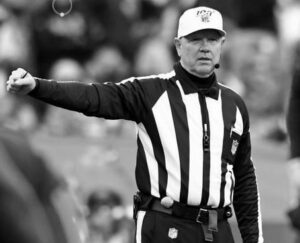
The final punt return by Kansas City on Sunday (with just 41 seconds remaining in the game) was returned 29 yards to midfield. There were no penalties called on this play despite the two obvious infractions (mentioned earlier in this story) which could be seen by millions of viewers watching at home via television.
Here’s my theory as to why the referees (perhaps) purposefully swallowed their whistles. Remember what I said earlier about the NFL wanting its football games to be played within a three hour window of the kickoff?
The NFL referees assigned to the Kansas City/Cincinnati game had already been embroiled in an earlier fourth quarter incident. With a little more than ten minutes remaining in the game, the head referee (via an open microphone) told the clock operator to run the clock on his whistle to signal the beginning of a Chiefs’ third down play.
There was one big problem, though. The clock had already stopped (properly) after the second down play ended with an incomplete pass by Kansas City.
The clock operator (as instructed by the head Referee) followed directions and started running the clock prior to Kansas City’s third down play. The Chiefs failed to convert the third down play and brought on their punting unit.

Then the fun began.
Just prior to the fourth down punt attempt, the head Referee stopped the game once again. He opened his microphone to reveal that another of his crew members had (wink) attempted to call for a clock stoppage prior to the previously completed third down play.
In other words, the head Referee permitted Kansas City to have a do-over on their third down play. Yes, the extra play resulted in a first down for the Chiefs as a pass-interference call was made against a Cincinnati defensive back (a proper call).
First down, Chiefs! Thanks to this group of NFL referees, that is.
Cincinnati’s defense would then force the Chiefs to punt the ball after its next series of downs. Fortunately, the score didn’t change as a direct result of the referees’ two moments of confusion.
The Chiefs still received one extra opportunity to move the football downfield as a result of the unnecessary mistake by the game’s officials during the prior series of plays.
Consider this. While the Head Referee and crew conferred about their own self-inflicted mistake, the NFL’s internal game clock for its advertisers kept moving during this stoppage of play.
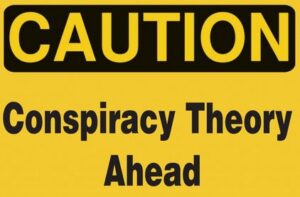
Adding to my conspiracy theory, this football game kicked-off at 5:40PM Central and ended in three hours and 23 minutes. It is quite likely that the officiating crew became quite aware that the game was now running significantly late (by NFL standards) as the fourth quarter advanced.
Don’t forget that CBS was scheduled to run another television show right after the football telecast ended. All parties were doing their own version of the “Hurry Up…get this game over with!”
During the waning minutes of this game (now about twenty minutes behind the NFL’s 3-hour preferred completion time), does it surprise you that the referees may have become reluctant to slow down the action during the final minutes to call any additional (translated – not obvious to the casual fan) penalties to slow the game’s end even more?
The NFL’s referees are paid by the league. They are reviewed by the NFL management team every week about how well they officiated the game. In case you were wondering, the Cincinnati Bengals were penalized nine times on Sunday, while the Chiefs had just four.
Entering the fourth quarter with a tie score of 20-20, this game seemed like a fairly even match-up of two very good football teams competing for the AFC title.
If you were rooting for Kansas City, you were quite happy with the 23-20 final outcome of this game.
If you were pulling for Cincinnati, you may have already joined the “NFL Rigged” Twitter group by now. I’m sure there are plenty of Saints fans willing to welcome you into the club!
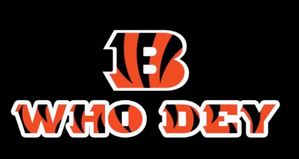
Who Dey? It’s dem doggone NFL referees again, dat’s who!

